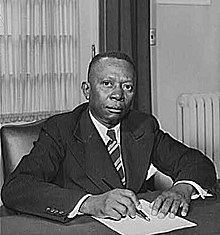William Tubman
| William Tubman | |
|---|---|
 |
|
| 19th President of Liberia | |
|
In office 3 January 1944 – 23 July 1971 |
|
| Vice President |
Clarence Simpson (1944-1952) William R. Tolbert, Jr. (1952-1971) |
| Preceded by | Edwin Barclay |
| Succeeded by | William R. Tolbert, Jr. |
| Personal details | |
| Born |
William Vacanarat Shadrach Tubman 29 November 1895 Harper, Liberia |
| Died | 23 July 1971 (aged 75) London, England |
| Political party | True Whig |
| Spouse(s) | Antoinette Tubman |
| Religion | Methodism |
William Vacanarat Shadrach Tubman (November 29, 1895 – July 23, 1971) was a Liberian politician. He was the 19th President of Liberia, serving from his election in 1944 until his death in 1971.
Tubman is regarded as the "father of modern Liberia"; his presidency was marked by attracting sufficient foreign investment to modernize the economy and infrastructure. During his tenure, Liberia experienced a period of prosperity. He also led a policy of national unity in order to reduce the social and political differences between his fellow Americo-Liberians and the indigenous Liberians.
William Tubman was born November 29, 1895, in Harper, Liberia. Tubman's father, the Reverend Alexander Tubman, was a stonemason, general in the Liberian army, and a former Speaker of the Liberian House of Representatives, as well as a Methodist preacher. A strict disciplinarian, he required his five children to attend daily family prayer services and sleep on the floor because he thought beds were too soft and "degrading to character development." Tubman's mother, Elizabeth Rebecca (née Barnes) Tubman, was from Atlanta, Georgia. Alexander's parents, Sylvia and William Shadrach Tubman, were freedmen, part of a group of 69 freed slaves whose transportation to Liberia in 1844 was paid by their former mistress Emily Tubman, a widow and philanthropist in Augusta, Georgia.
Emily Tubman was instrumental in the manumission of enslaved African Americans and paying for their transportation to Liberia for "repatriation." Initially, she had great difficulty freeing her slaves in ante-bellum Georgia. Despite appeals to the Georgia State Legislature and financial donations to the University of Georgia, her efforts to manumit numerous slaves were disapproved. Since the Nat Turner Slave Rebellion in 1831, the state legislature had greatly restricted manumissions, requiring a legislative act for each, and posting of expensive bonds by the owner to guarantee the free black would leave the state within a short period of time.
...
Wikipedia
